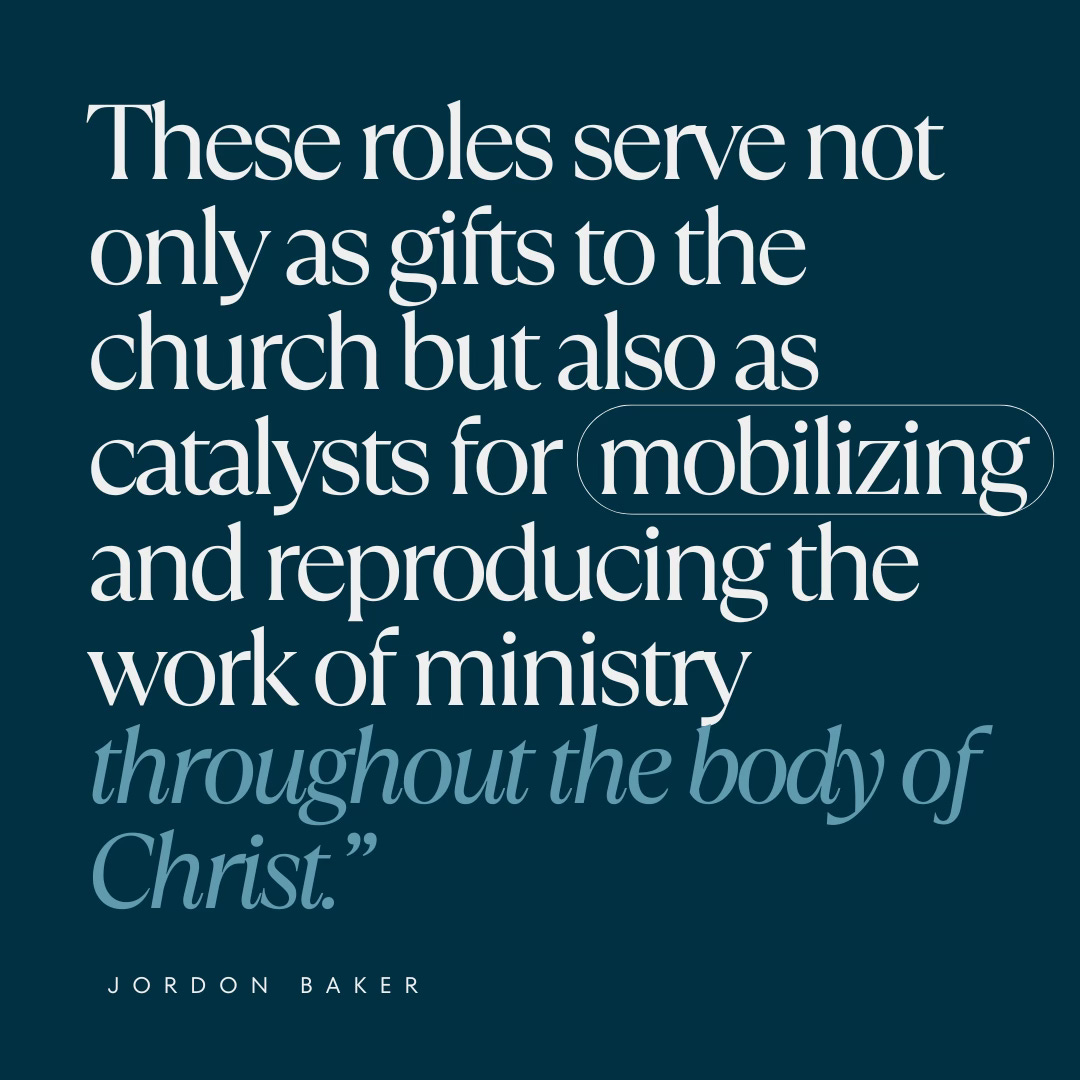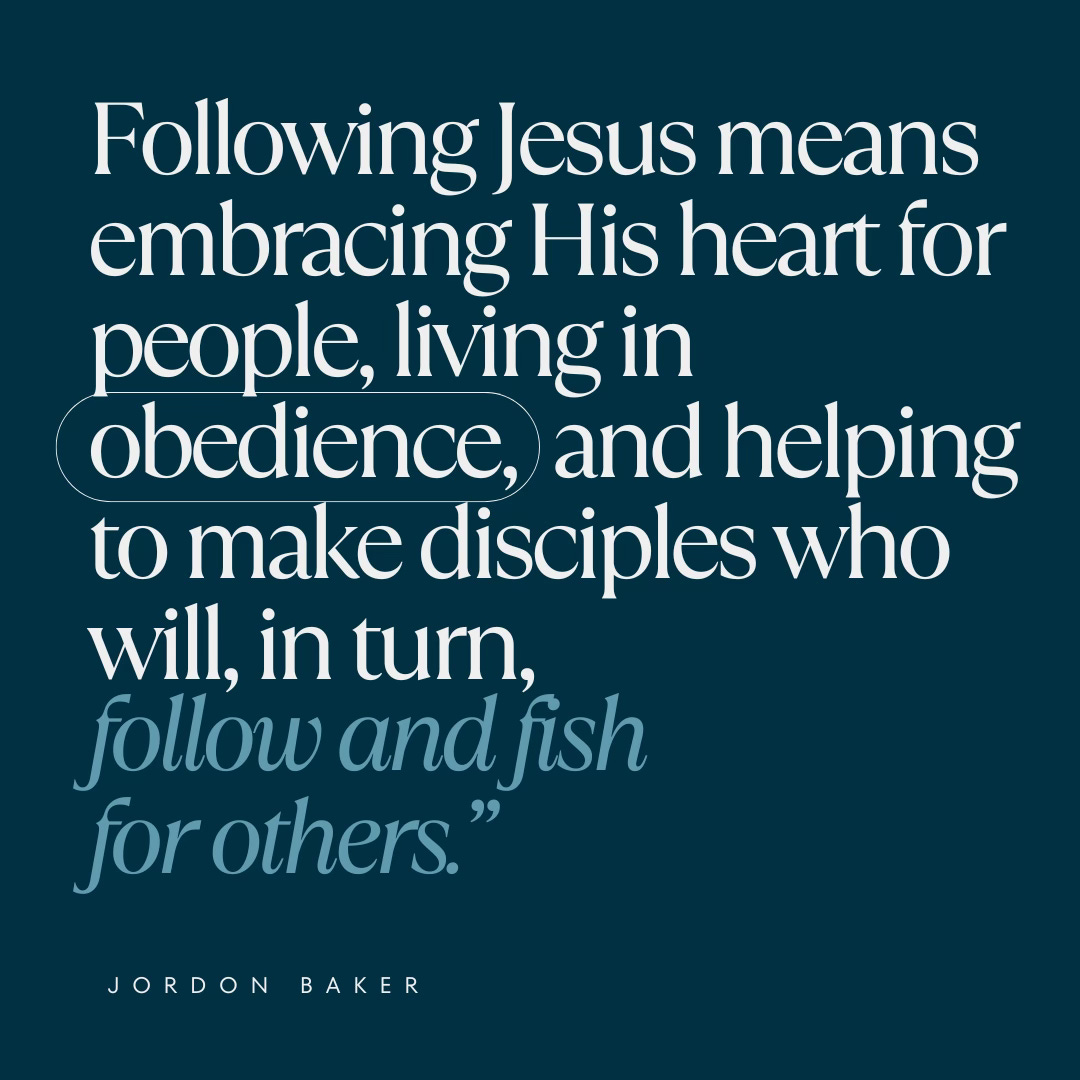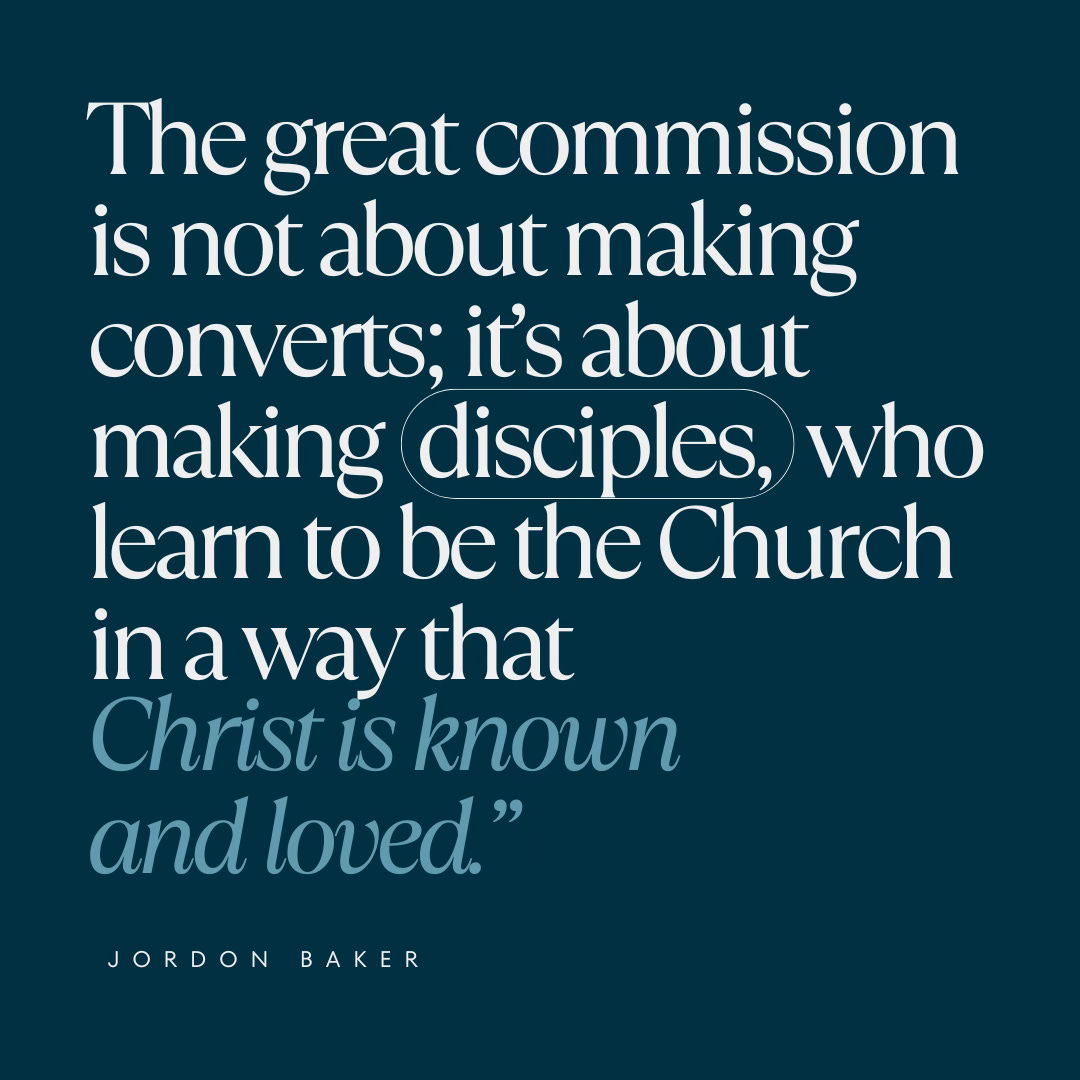Embracing the Great Commission and Fivefold Ministry
How APEST Equipping and Disciple-Making Work Together
By Jordon Baker
Ten years ago, I radically encountered Jesus at a prayer room in Kansas City during the One Thing conference in 2014. In one weekend, my unbelieving heart of stone was changed into a heart of flesh. From agnostic new ager – to lover of Jesus. I have been involved in the worship and prayer movement in a variety of capacities since, including leading a worship and prayer room locally, overseeing a city-wide prayer ministry, and serving globally connecting prayer leaders with disciple making training. Night and day adoration to Jesus has been regular Christianity to me, and for that I am eternally grateful.
For the first 8 years of our ministry my wife and I did a good job gathering believers to minister to the Lord, uniting local churches for extended hours of worship and prayer regularly. During the Covid lockdowns the Lord started showing us the importance of our home becoming a literal house of prayer. I sensed God directing us toward a simpler expression of being the Church, rooted in Acts 2:42-47. He shifted the focus of our ministry by presenting a challenging question: "If you remove your Sunday gathering, what is your plan to fulfill the Great Commission?"
What is my plan to fulfill the great commission? This question opened a time of deep reflection on what it means to be a disciple of Jesus. Up to that point, I had considered myself a "prayer and worship guy," focused on creating environments of adoration and intercession. But this question stirred something deeper. What did it mean to actively make disciples? Was I truly engaging others to go out, reach the lost, and make more disciples?
Sure, I preach on Sunday mornings, I had seen people respond to altar calls, and witnessed lives touched in prayer rooms. But if I am honest, I realized that I had not been intentional with Jesus’ parting words to his first disciples. I’ve spent countless hours praying for the Lord of the harvest to send awakening, to send laborers into His harvest field—and somewhere along the way, I forgot that He calls each of us to be part of that mission. It's not just about praying for others to go; it’s about actively engaging in the work ourselves. True disciple-making isn’t just about big moments of response—it’s about ongoing, relational investment in guiding others to live as faithful followers of Christ.
In this process, God began to prune our thoughts and motivations – inviting us to embrace an identity as the Church that isn’t defined by a few hours on a Sunday morning. Scripture calls us living stones, a royal priesthood, the body and bride of Christ, entrusted with the ministry of reconciliation. These aren’t just descriptions; they are declarations of our purpose and role as God’s people. Yet, when we talk about the Church, the conversation often drifts into debates about models—whether it’s the structure of services, when and where we meet, how we handle finances, or the merits of megachurches versus house churches. Too often, we focus on cleaning the outside of the cup—fine-tuning aspects of church life but missing the Lord's heart to transform our desires.
Around the time the Lord began challenging us, we started hearing incredible testimonies and connecting with disciple-making movements in some of the most unexpected places—places
like Iran, Afghanistan, Northern India, and South Asia. We also became connected with disciple-makers and simple church planters across the United States. Their experiences and perspectives challenged us and convicted us to rely solely on the Word of God as our guide.
While we had done well at gathering believers, God was calling us to something new—actively engaging the lost with the hope and redemption of the gospel. This has prompted us to explore how to live missionally, making disciples who can also make disciples. Now, our focus is on teaching others to be disciples of Jesus and how to be the church organically in the places they already live, work, and play. Whether it’s in homes, parks, coffee shops, or apartment complexes, we are learning to be the Church where life happens, and to equip others to do the same.
This journey has led us to explore some distinctions between equipping the saints for ministry, as highlighted in Ephesians 4:12, and disciple making, as commissioned by Jesus in Matthew 28:19-20.
Equipping the Saints for the Work of the Ministry
In Ephesians 4, Paul writes that God gave the church apostles, prophets, evangelists, shepherds, and teachers “to equip the saints for the work of ministry, for building up the body of Christ.” These five roles are often referred to as the "fivefold ministry" or APEST—a term derived from the first letters of Apostles, Prophets, Evangelists, Shepherds and Teachers.
These roles serve not only as gifts to the church but also as catalysts for mobilizing and reproducing the work of ministry throughout the body of Christ. Each role equips the saints to join in this work, ensuring the Church’s mission continues to grow and multiply.
Apostles: Apostles are pioneers who see the larger picture of God’s kingdom and are passionate about expanding its reach. They invite others into the work of ministry by fostering a culture of multiplication. Apostles equip others to step into new territories, take risks for the sake of the gospel, and lay foundational principles for future growth. They reproduce by mentoring leaders, creating a culture of sending and being sent - empowering others to carry out missional work.
Prophets: Prophets are those who deeply discern God’s voice and call the church to alignment with His will. They invite others into ministry by encouraging intimacy with God, prayer, and a heart for justice. Prophets reproduce themselves by teaching others to listen to the Holy Spirit, discern God’s direction, and boldly speak truth in love. They challenge the church to remain faithful to God’s purposes.
Evangelists: Evangelists have a passion to share the good news of Jesus Christ and invite others into the life-transforming reality of the gospel. They draw the body into ministry by modeling a lifestyle of outreach and inviting believers to join them in sharing their faith. Evangelists reproduce themselves by training others to share the gospel message, engage with unbelievers, and cultivate relationships that point others to Christ.
Shepherds: Shepherds nurture and care for the flock, creating environments of safety, growth, and healing. They invite others into ministry by modeling sacrificial love, encouraging mutual care, and equipping others to meet the needs of those around them. Shepherds reproduce themselves by developing other caregivers within the church and remains interconnected and healthy.
Teachers: Teachers anchor the church in the truth of Scripture, ensuring sound doctrine and practical application in the life of the believer. They invite others into ministry by creating a hunger for God’s Word and providing tools for interpreting and applying Scripture. Teachers reproduce themselves by equipping others to teach and creating a culture of lifelong learning. They help the body of Christ grows in depth and maturity.
There is a real need for the church to sacrificially devote themselves to one another, utilizing their gifts for mutual benefit. Nurturing and developing believers who are already part of the church community. APEST functions are given to equip the saints for ministry, not merely to lead or manage a congregation. It is not about hierarchical titles but functioning as a body that is able to fulfill all aspects of Jesus’ mission. The work is largely internal, working to mature believers so that they can effectively serve one another and engage the world with greater clarity.
For 8 years, much of my time was given to this kind of work. “Discipleship” looked like walking with other believers; teaching them to cultivate a prayer life, how to engage with God’s word, and follow Jesus in their day to day lives. But now I realize that equipping the saints is one piece of a larger mission. Our calling extends beyond nurturing the saved; it also means actively reaching the lost, discipling them in practical, relational ways, and empowering them to disciple others in turn. This is the heartbeat of the Church—living out the Great Commission in every part of our lives.
Disciple Making as Commissioned by Jesus in Matthew 28
Matthew 28 calls believers to step outward, making disciples of all nations. Jesus commands His followers to “go and make disciples,” Disciple-making involves actively engaging with the world outside of our church families. This is a call to relationally invest in others, leading them into an encounter with Jesus and a life transformed by His teachings. Equipping primarily focuses on the growth of current believers, while disciple-making extends the gospel message to those who have yet to believe.
I've been in meetings where the focus is on how to attract the lost to come into our churches, but I wonder if we might be asking the wrong question. The responsibility of evangelism rests on believers going to the lost, not on the lost coming to us. Jesus described His followers as being “like sheep among wolves.” Disciple-making demands that we move beyond what’s comfortable. Yet, as we go, we don’t go alone. Jesus promises His presence and guidance, assuring us that He will be with us “to the very end of the age.”
The first disciples faced a mission that seemed impossible according to the flesh. They had no financial resources, were persecuted by both religious authorities and the government, had limited means of travel, and no immediate strategic plan. Yet, in Acts 1:8, Jesus reveals what would be the source of their strength: “You will receive power when the Holy Spirit comes on you; and you will be my witnesses in Jerusalem, and in all Judea and Samaria, and to the ends of the earth.” This power from the Holy Spirit was specifically given for the purpose of bearing witness to the glory of Jesus Christ. Holy Spirit empowers us to make Jesus known! To carry His message to the farthest reaches of the earth, despite any obstacle.
In Matthew 28:20, Jesus commissions His disciples not simply to teach knowledge, but to "teach them to obey everything I have commanded you.” Obedience leads to a transformational faith over an intellectual understanding alone. Jesus calls His followers to actively live out His teachings, embodying His message in their daily lives and inviting others to do the same.
Disciple-making movements around the world draw directly from this mandate, focusing on obedience to the scriptures and real-life application rather than just information transfer. Discovery Bible Study (DBS) is a great tool that has helped us align with this approach. DBS invites spiritually curious individuals or small groups to read a passage of Scripture together, ask questions, and discuss how they will apply what they’ve learned. Participants are encouraged to take responsibility for putting God’s Word into practice, holding each other accountable for living in obedience rather than simply gaining knowledge. This empowers people to become self-feeding disciples who can encounter God’s voice personally in the Scriptures, respond with obedience, and then share what they’re learning with others.
In Luke 5, we see an example of how obedience in disciple-making leads to a deeper revelation of Jesus. Peter had a night of unsuccessful fishing. Then, he encounters Jesus, who tells him to cast his nets again into deep water. Despite Peter’s doubts, he obeys Jesus, saying, “Master, we’ve worked hard all night and haven’t caught anything. But because you say so, I will let down the nets” (Luke 5:5). This act of obedience led to a miraculous catch of fish so great that their nets began to break. Peter falls to his knees and calls Jesus Lord, immediately aware he is a sinful man in the presence of God. This shift in language reveals a transformation in Peter’s heart; he moves from seeing Jesus as a respected teacher to seeing Him as the sovereign Lord. Jesus then declares, “Don’t be afraid; from now on you will fish for people” (Luke 5:10).
This statement reveals that following Jesus means both a personal transformation and a new mission—one that involves drawing others into the Kingdom. Following and fishing. Obeying and sharing. Following Jesus means embracing His heart for people, living in obedience, and helping to make disciples who will, in turn, follow and fish for others.
What if our lost coworkers, family members, neighbors, and friends were invited to experience the power of obeying Christ, even before fully believing in Him as Lord? What if they witnessed firsthand the impact of following the King and living by His ways? Like Peter, who obeyed Jesus before fully grasping His divinity, could a culture that often sees Jesus as merely a good teacher come to recognize His Lordship through the tangible results of simple acts of obedience? Perhaps, as they encounter His goodness and authority through these small steps, they would gain a clearer vision of who Jesus truly is—transforming their understanding from “teacher” to “Lord.”
How APEST Equipping and Disciple-Making Work Together
The world will not be evangelized through an individual. But through the body of Christ working in one accord- Jesus is looking to establish spiritual families in an area that become a counter cultural witness of love, unity, sacrifice, and devotion to the Lord and one another. The way that we are the church in our city has a direction relationship with seeing the gospel spread and multiply through our communities. This kind of witness speaks louder than words, showing a watching world what it truly means to follow Jesus.
The great commission is not about making converts; it’s about making disciples, who learn to be the Church in a way that Christ is known and loved. Where every member of the body is equipped to reach others. This is Jesus’s plan for multiplication—not just growing numbers but making disciples who reflect Him, drawing others through their testimonies.
In my own journey, I’ve come to realize that equipping and disciple-making are two sides of the same coin. Equipping without disciple-making can lead to a comfortable but insular community, while disciple-making without equipping can result in zeal without depth. Only when both are present can the Church fully embody its calling as the body of Christ, bringing the message of reconciliation to a world in need.










Timely and a great read.